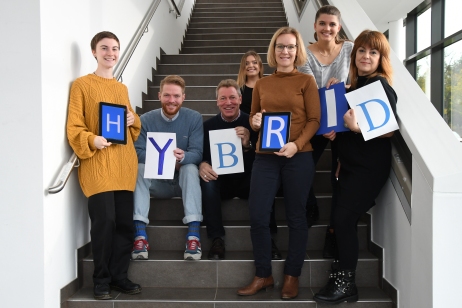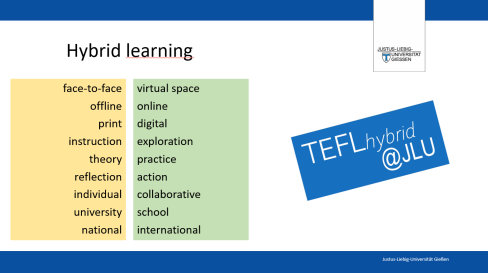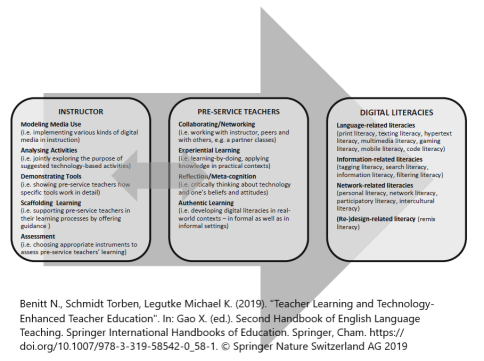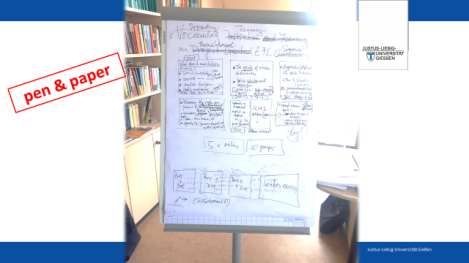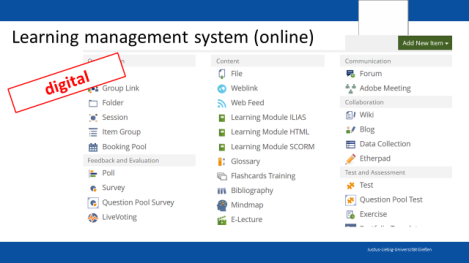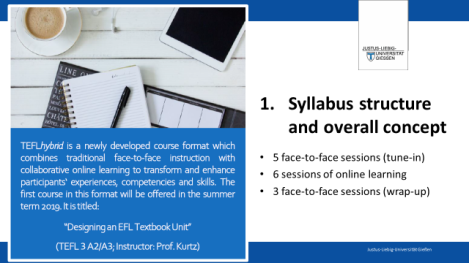posted by Jürgen Kurtz, Justus Liebig University (JLU) Giessen, Germany
TEFLhybrid@JLU (TEFL = Teaching English as a Foreign Language; JLU = Justus Liebig University) is a newly developed course initiative which seeks to explore the potential of hybrid learning within the pre-service teacher education program at Giessen University. Broadly speaking, a hybrid format of course delivery combines face-to-face instruction with collaborative, increasingly self-regulated, online learning in virtual space to transform and enhance students’ learning experience (cf. Zibelius 2015). More specifically, hybrid learning refers to “a mixture of instructional modalities (i.e. onsite, web-based and self-paced learning), delivery media (e.g. the Internet, classroom sessions, web-based courses, CD-ROMs, video, books, or PowerPoint slides), instructional methods (i.e. face-to-face or technology-based sessions), and web-based technologies, both synchronous and asynchronous (e.g. chat rooms, wikis, virtual classrooms, conferencing tools, blogs, textbooks or online courses). The choice of a blend is usually determined by several factors: the nature of the course content and learning goals, student characteristics and learning preferences, teacher’s experience and teaching style, or online resources” (Klimova & Kacetl 2014: 478). At Giessen University, hybrid learning courses focus on the following nine dimensions of hybridity in learning and instruction:
In accordance with current research on technology-enhanced pre-service teacher education (cf. Benitt, Schmidt & Legutke (2019: 9), TEFLhybrid@JLU aims to reflect “the complex and multifaceted relationship between students, teachers, subject matter, and teaching and learning methods and technologies. It emphasizes the importance of the complexities of interactions between technological (e.g., using a computer program to teach pronunciation), content (English phonetics), and pedagogical knowledge (approaches and methods to teach pronunciation) in relation to specific teaching contexts (e.g., elementary school EFL learners in their first year learning the language).”
In short, TEFLhybrid courses @JLU seek to “not only build bridges between theory and practice but also, simultaneously, promote the growth of technological pedagogical content knowledge as an integrated dimension of language teacher education, taking into consideration dimensions of language, culture, and teacher self” (Benitt, Schmidt & Legutke 2019: 20). This graphic summarizes the underlying pedagogical concept (click to enlarge):
Developing language teachers’ digital competencies (Benitt, Schmidt & Legutke 2019) © Springer Nature Switzerland AG 2019
Typically, a TEFLhybrid course @JLU comprises four to six introductory classroom sessions (face-to-face), followed by six to seven weeks of student-regulated online learning (increasingly autonomous project work in small groups), and three to four final in-class sessions to give all participants the opportunity to present their project work. Throughout a hybrid course, specially trained student learning advisors (TEFLhybrid learning advisors) offer assistance both in technological and language pedagogical matters (weekly online as well as face-to-face office hours). Within this format, all interaction takes place in the English language (English Medium of Instruction Context).
“Current research in foreign language teacher education clearly indicates that keeping a learning log has a lot of potential for personal and professional development – for learners, teachers and researchers. […] The use of learning logs as reflective narratives has become an important instrument in teacher development research […] as they provide valuable insights into areas of interest that are very difficult to access otherwise” (Benitt 2015: 109). Thus, all students participating in a TEFLhybrid course are requested to keep weekly learning logs. The logs are usually peer reviewed; more complex questions arising in this process are discussed in depth with the course instructor.
In general, the TEFLhybrid team (see image above) typically starts planning courses six months before they are offered, employing pen and paper as well as digital materials, resources, and tools (here, in particular, the ILIAS learning management system). The next two slides are intended to illustrate the complexity (and hybridity) of the planning process (click to enlarge):
In April 2019, we launched the pilot course (“Designing an EFL Textbook Unit”), followed by two TEFLhybrid courses in Oktober 2019 (“Promoting Vocabulary Learning in Theme-based EFL Sequences”; “Fostering Oral Communication Skills through Task-supported Language Learning”). In April 2020, we are going to offer a total of four hybrid learning TEFL courses (“Developing Multisensory Material for Primary School”; “Mentoring Learners in Writing Activities”; “Fostering Language and Culture Education in the EFL Classroom”; “Evaluating and Producing EFL Textbook Units”).
Our research interest centers around the project’s possibilities and limitations as perceived by all stakeholders. A mixed-methods approach is taken by juxtaposing data emerging from questionnaires as well as from the data generated on the online platform (students’ learning logs). For further information, please visit our brand-new TEFLhybrid-Website @JLU.
Stay tuned for a first analysis of student evaluations of the pilot course …
References
Benitt, Nora (2015). Becoming a (better) language teacher. Classroom action research and teacher learning. Tübingen: Narr Francke Attempto (Giessener Beiträge zur Fremdsprachendidaktik / Giessen Contributions to Foreign Language Pedagogy).
Benitt N., Schmidt Torben, Legutke Michael K. (2019). “Teacher Learning and Technology-Enhanced Teacher Education”. In: Gao X. (ed.). Second Handbook of English Language Teaching. Springer International Handbooks of Education. Springer, Cham. https://doi.org/10.1007/978-3-319-58542-0_58-1.
Klimova, Blanka Frydrychova; Kacetl, Jaroslav (2015). “Hybrid Learning and its current role in the teaching of foreign languages”. In: Procedia – Social and Behavioral Sciences 182, 477–481.
Zibelius, Marja (2015). Cooperative learning in virtual space. Tübingen: Narr Francke Attempto (Giessener Beiträge zur Fremdsprachendidaktik).


